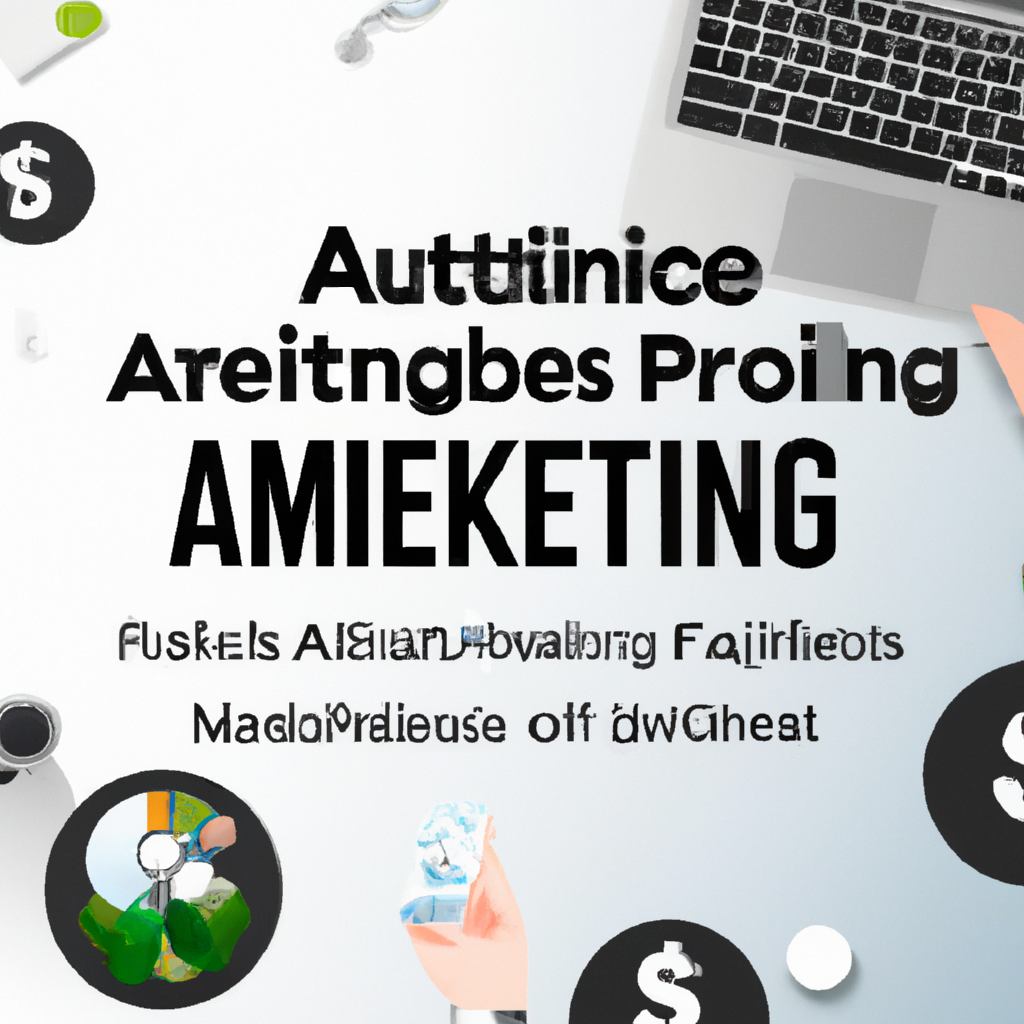What Are The Key Strategies For Successful Affiliate Marketing?
October 5, 2023 | by Gerry Lim

Are you looking to become a successful affiliate marketer? Wondering what strategies you should focus on to achieve your goals? In this article, we will explore the key strategies for successful affiliate marketing. From building a strong online presence to choosing the right affiliate products, we will dive into the essential steps that can help you excel in the world of affiliate marketing. Whether you are a beginner or an experienced marketer, these strategies will provide you with the insights and tools you need to thrive in this industry. So, let’s get started!
Choosing the right affiliate programs
Affiliate marketing offers a great opportunity to earn passive income online, but in order to be successful, it’s important to choose the right affiliate programs to promote. With countless options available, here are some key considerations to help you make an informed choice.

Researching different affiliate programs
Before jumping into any affiliate program, take the time to research and explore different options. Look for programs that align with your niche or area of expertise, as this will make it easier to connect with your target audience. Consider factors such as the reputation of the company, the products or services they offer, and the commission rates they provide.
Evaluating the product or service
One of the most important aspects of affiliate marketing is promoting products or services that you genuinely believe in. Take the time to evaluate the quality and relevance of the offerings. Ask yourself if it’s something you would personally use or recommend. This will help you build trust with your audience and ensure your promotional efforts are authentic.
Considering commission rates and payment terms
While it’s important to focus on promoting products you believe in, it’s also crucial to consider the financial aspect of affiliate marketing. Evaluate the commission rates offered by different programs and consider the payment terms. Some programs may offer higher commissions but have longer payment cycles, so take these factors into account when making your decision.
Assessing the affiliate program’s reputation
Before committing to an affiliate program, it’s essential to assess their reputation in the industry. Look for reviews and feedback from other affiliate marketers to get a sense of their experiences. Consider factors such as the program’s track record of timely payments, their communication with affiliates, and the overall satisfaction of their partners. Choosing a reputable affiliate program will increase your chances of success and ensure a positive working relationship.
Building a strong online presence
Once you’ve chosen the right affiliate programs to promote, it’s time to build a strong online presence to attract and engage with your target audience. Here are some key strategies to help you establish and enhance your online presence.
Creating a professional website or blog
A professional website or blog is the foundation of your online presence. Invest in a user-friendly website with a clean design and easy navigation. Ensure that your website reflects your niche and aligns with the products or services you’re promoting. Make it easy for visitors to find relevant information and navigate through your content.
Optimizing website or blog for search engines
Search engine optimization (SEO) is essential to drive organic traffic to your website. Research relevant keywords and incorporate them strategically into your content. Optimize your meta tags, page titles, and URLs to improve your website’s visibility in search engine results. Regularly update and refresh your content to improve your search rankings.
Creating high-quality content
Creating valuable and engaging content is key to attracting and retaining your audience. Focus on producing high-quality articles, blog posts, videos, and other forms of content that provide valuable information to your audience. Share your expertise and insights, and aim to solve their problems or address their needs. Remember to include relevant affiliate links within your content in a natural and non-spammy way.
Engaging with the audience through social media
Social media platforms provide a great opportunity to connect and engage with your audience. Create a presence on platforms such as Facebook, Instagram, Twitter, and LinkedIn, and regularly share content and updates relevant to your niche. Encourage interaction and respond to comments and messages promptly. Building relationships and fostering engagement will help solidify your online presence.
Building an email list
Building an email list is an effective way to communicate directly with your audience and promote affiliate offers. Offer a valuable lead magnet, such as an ebook or exclusive content, in exchange for visitors’ email addresses. Use an email marketing platform to send regular newsletters, updates, and promotions to your subscribers. Building and nurturing an email list will allow you to cultivate a loyal audience and increase your affiliate marketing success.
Driving targeted traffic to affiliate offers
To maximize your affiliate marketing success, it’s crucial to drive targeted traffic to your affiliate offers. Here are some effective strategies to attract the right audience to your promotions.
Implementing effective SEO strategies
As mentioned earlier, optimizing your website for search engines is essential. Research and incorporate relevant keywords into your content, optimize your meta tags, and build high-quality backlinks to improve your search engine rankings. Implement on-page and off-page SEO tactics to drive targeted organic traffic to your website and affiliate offers.
Leveraging social media marketing
Social media platforms are not only great for engaging with your audience but also for driving targeted traffic. Create compelling and shareable content and leverage social media advertising tools to target specific demographics and interests. Encourage your followers to share your content with their networks, increasing your reach and generating more traffic to your affiliate offers.
Using paid advertising methods
Paid advertising methods such as Google Ads, Facebook Ads, and Instagram Ads can be highly effective in driving targeted traffic to your affiliate offers. Set a budget, define your target audience, and create engaging and persuasive ad campaigns that lead directly to your promotions. Continuously monitor and optimize your ad campaigns to maximize conversions and ROI.
Participating in forums and online communities
Forums and online communities related to your niche are a great way to connect with your target audience and drive traffic to your affiliate offers. Participate in relevant discussions, offer valuable insights and advice, and include links to your content or promotions when appropriate. Be genuine and helpful, and you’ll find that people will be more inclined to visit your website and explore your affiliate offers.
Guest posting on relevant blogs
Guest posting on relevant blogs is an effective way to expand your reach and drive targeted traffic to your affiliate offers. Find authoritative blogs in your niche and offer to write high-quality guest posts that provide value to their readers. Include a bio or author’s section with a link back to your website or relevant affiliate offers. This not only drives traffic but also helps establish your credibility and authority within your niche.
Understanding and targeting your audience
To effectively promote affiliate products or services, it’s essential to understand your target audience and tailor your marketing efforts to meet their needs. Here are some strategies to help you better understand and connect with your audience.

Researching and identifying your target audience
Start by conducting thorough research to identify your target audience. Understand their demographics, interests, and needs. Use tools such as Google Analytics, social media insights, and keyword research to gain insights into who your audience is and what they are searching for.
Creating buyer personas
Once you have a clear understanding of your target audience, create buyer personas to represent different segments within your audience. Develop detailed profiles that include demographics, interests, pain points, and motivations. This will help you create content and promotions that resonate with each specific persona.
Analyzing audience demographics and interests
Utilize analytics tools to monitor and analyze audience demographics and interests. This will provide valuable insights into what types of content and promotions resonate most with your audience. Use this information to fine-tune your marketing strategies and tailor your messages accordingly.
Tailoring content to meet audience needs
Based on your research and analysis, create content that specifically addresses the needs and interests of your target audience. Offer solutions to their problems, answer their questions, and provide valuable information that caters to their specific interests. Ensure your content speaks directly to their pain points and shows them how the affiliate products or services you promote can help them.
Using analytics tools to track audience behavior
Continuously track and analyze audience behavior using tools such as Google Analytics. Monitor metrics like website traffic, bounce rate, time on page, and conversion rates. This data will help you understand what is working and what needs improvement, allowing you to make data-driven decisions to optimize your marketing efforts.
Choosing the right products or services to promote
Selecting the right products or services to promote is pivotal in successful affiliate marketing. Here’s what you need to consider when making this crucial decision.
Aligning with your niche or area of expertise
It’s crucial to promote products or services that align with your niche or area of expertise. By doing so, you are more likely to attract an engaged and interested audience who trust your recommendations. Focus on promoting offerings that are relevant and complementary to your content.
Researching and evaluating potential products or services
Take the time to research and evaluate potential products or services before promoting them. Consider factors such as the product’s quality, features, and benefits. Look for positive reviews and testimonials from customers to ensure the product or service is reputable and satisfies the needs of your audience.

Considering customer demand and popularity
Promoting products or services with high customer demand and popularity can lead to greater success. Research trends and analyze market demand to identify lucrative opportunities. Consider the potential for recurring purchases or upsells to maximize your earnings.
Assessing product quality and reputation
To maintain the trust and credibility you have built with your audience, it’s critical to promote high-quality products or services. Evaluate the reputation of the company or brand behind the offering. Read reviews, research customer feedback, and ensure the product meets your own standards of quality.
Ensuring products or services are relevant to your audience
Always prioritize relevance when selecting products or services to promote. Your audience should see the value and connection between your content and the offerings you recommend. By staying true to your niche, you will attract an audience that is genuinely interested in the products or services you promote, resulting in higher conversion rates.
Building trust and credibility
Trust and credibility are essential in affiliate marketing. Building strong relationships with your audience is key to long-term success. Here are some strategies to establish trust and credibility with your audience.
Providing honest and unbiased reviews
One of the best ways to build trust with your audience is to provide honest and unbiased reviews of the products or services you promote. Highlight both the pros and cons, and be transparent about any limitations or potential drawbacks. Your audience will appreciate your authenticity and honesty.
Sharing personal experiences and testimonials
Sharing personal experiences and testimonials can be a powerful way to establish credibility. If you have personally used or experienced the product or service you are promoting, share your story and insights. Encourage satisfied customers to provide testimonials, and include these on your website or in your content.
Promoting only high-quality products or services
By promoting only high-quality products or services, you demonstrate your commitment to your audience’s best interests. Ensure that your promotions align with your values and standards. This will reinforce the trust your audience has in your recommendations and increase the likelihood of conversions.
Being transparent about affiliate relationships
Transparency is crucial in affiliate marketing. Clearly disclose your affiliate relationships to your audience. Let them know that you may receive a commission if they make a purchase through your affiliate links. Being open and honest about your affiliate relationships builds trust and shows your audience that you have their best interests in mind.

Engaging with the audience and addressing concerns
Active engagement with your audience is vital to building trust and credibility. Respond to comments, messages, and inquiries promptly and transparently. Show your audience that you value their feedback and are dedicated to addressing their concerns. This personal touch can go a long way in establishing strong relationships.
Effective use of affiliate marketing tools
To maximize your affiliate marketing efforts, it’s important to leverage the right tools and resources. Here are some key tools to help you effectively manage and optimize your affiliate campaigns.
Utilizing affiliate networks and platforms
Affiliate networks and platforms provide a centralized hub where you can find and manage multiple affiliate programs. Join reputable networks and platforms that offer a wide range of products or services relevant to your niche. These platforms also provide tracking systems and analytics to help you monitor and optimize your campaigns.
Tracking and analyzing performance metrics
Tracking and analyzing performance metrics are crucial to understanding what is working and what needs improvement in your affiliate marketing campaigns. Utilize tracking tools and metrics provided by affiliate networks and platforms, or invest in third-party tracking software. Monitor metrics such as clicks, conversions, and earnings to optimize your campaigns for maximum ROI.
Testing and optimizing affiliate campaigns
Testing and optimization are key to improving the performance of your affiliate campaigns. Implement split testing techniques to compare different offers, landing pages, and promotional strategies. Analyze conversion rates and performance data to identify areas for improvement and refine your campaigns based on the results.
Utilizing promotional tools and resources
Leverage promotional tools and resources provided by affiliate programs and networks. These may include banner ads, email templates, social media graphics, and more. Utilize these resources to communicate effectively with your audience and encourage click-throughs and conversions.
Utilizing email marketing software
Email marketing is a powerful tool for promoting affiliate offers and nurturing relationships with your audience. Invest in email marketing software that provides features such as list management, automation, and customization. Use targeted email campaigns to deliver personalized promotions and valuable content to your subscribers.
Developing strong relationships with merchants
Building strong relationships with the merchants or companies behind the affiliate programs you promote can lead to valuable opportunities and increased earnings. Here’s how you can develop and nurture these relationships.
Communicating regularly with merchants
Regular and open communication with merchants is essential to building strong relationships. Stay in touch with your affiliate managers or contacts, sharing updates on your marketing efforts and seeking their feedback or guidance. This ongoing dialogue will help you stay informed about new promotions, upcoming product launches, and other opportunities.

Negotiating higher commission rates
Once you have established a track record of success and have proven your value as an affiliate marketer, don’t hesitate to negotiate higher commission rates with merchants. Demonstrate the value you bring, highlight your conversions and audience engagement, and make a case for why you deserve an increase in commission.
Collaborating on promotional opportunities
Collaborating with merchants on promotional opportunities can be mutually beneficial. Offer to create content, host webinars, or participate in joint marketing efforts that promote both their products or services and your affiliate campaigns. This cooperative approach can help expand your reach and generate more sales.
Providing feedback and suggestions for improvement
Merchants appreciate feedback from their affiliate partners. Provide constructive feedback about their products, services, or landing pages to help them improve the overall user experience. Share your insights and suggestions for maximizing conversions and optimizing promotional materials. This demonstrates your commitment to their success and strengthens the relationship.
Leveraging merchant resources and support
Merchants often provide additional resources and support to their affiliate partners. Take advantage of these resources, such as training materials, marketing collateral, or dedicated support channels. These resources can help you refine your marketing strategies and stay up-to-date with the latest promotions and industry trends.
Staying updated with industry trends and changes
To stay ahead in the constantly evolving world of affiliate marketing, it’s crucial to stay updated with industry trends and changes. Here are some strategies to ensure you are always in the know.
Following industry blogs and publications
Subscribe to industry blogs and publications to stay informed about the latest trends, news, and insights in the affiliate marketing space. Follow thought leaders and experts in your niche to gain valuable perspectives and stay ahead of the curve. Regularly read and engage with these resources to deepen your knowledge and broaden your understanding.
Attending affiliate marketing conferences and events
Attend affiliate marketing conferences and events to network with industry professionals and gain valuable insights. These events often feature expert speakers, educational sessions, and networking opportunities. By participating in these events, you’ll be able to stay updated on the latest industry trends and connect with like-minded affiliates.
Networking with other affiliate marketers
Networking with other affiliate marketers provides an opportunity to share experiences, exchange ideas, and stay connected within the industry. Join relevant online communities, forums, or social media groups to connect with other affiliates. Collaborate, seek advice, and stay updated with the latest industry news through these networks.
Keeping up with changes in affiliate programs
Affiliate programs frequently update their terms, policies, and promotional materials. Staying updated with these changes is crucial to ensuring compliance and taking advantage of new opportunities. Regularly review updates from the programs you promote to stay informed and make necessary adjustments to your marketing strategies.
Continuously learning and adapting to industry changes
The field of affiliate marketing is dynamic and constantly evolving. It’s important to remain adaptable and continuously learn to stay ahead. Invest in your own education by attending webinars, online courses, or workshops focused on affiliate marketing. Stay curious and open to new strategies and tactics to keep your affiliate marketing efforts fresh and effective.
Testing and optimizing affiliate marketing strategies
Testing and optimization are key to success in affiliate marketing. Here are some strategies to help you continuously improve your affiliate marketing campaigns.
Split testing different offers and landing pages
Split testing, also known as A/B testing, involves comparing different versions of your offers or landing pages to determine which performs better. Test different headlines, call-to-action buttons, images, and content variations. Monitor the results and make data-driven decisions to improve conversion rates.
Analyzing conversion rates and performance data
Regularly analyze your conversion rates and performance data to identify areas for improvement. Use tracking tools and analytics software to gain insights into user behavior and engagement. Identify patterns or trends that may be impacting your conversion rates and make adjustments accordingly.
Optimizing SEO and marketing campaigns
SEO optimization is an ongoing effort. Continuously analyze and optimize your website’s SEO to improve organic traffic and visibility. Stay updated with the latest SEO trends and techniques, and make adjustments to your marketing campaigns based on the data and insights you gather.
Experimenting with different promotional methods
Don’t be afraid to experiment with different promotional methods to find what works best for you and your audience. Test different channels such as email marketing, social media advertising, content marketing, or influencer partnerships. Monitor the results and invest more in the tactics that yield the best outcomes.
Adapting strategies based on test results
Based on the insights gained from your testing and optimization efforts, adapt your strategies accordingly. Identify what is working well and replicate those successes. Similarly, address areas where you are not seeing the desired results and make necessary adjustments to improve performance.
In conclusion, successful affiliate marketing requires a combination of strategic decision-making, a strong online presence, targeted traffic generation, audience understanding, careful product selection, trust-building, effective use of tools, merchant relationships, staying updated, and continuous testing and optimization. By following these key strategies, you can maximize your chances of success in the competitive world of affiliate marketing.
RELATED POSTS
View all


